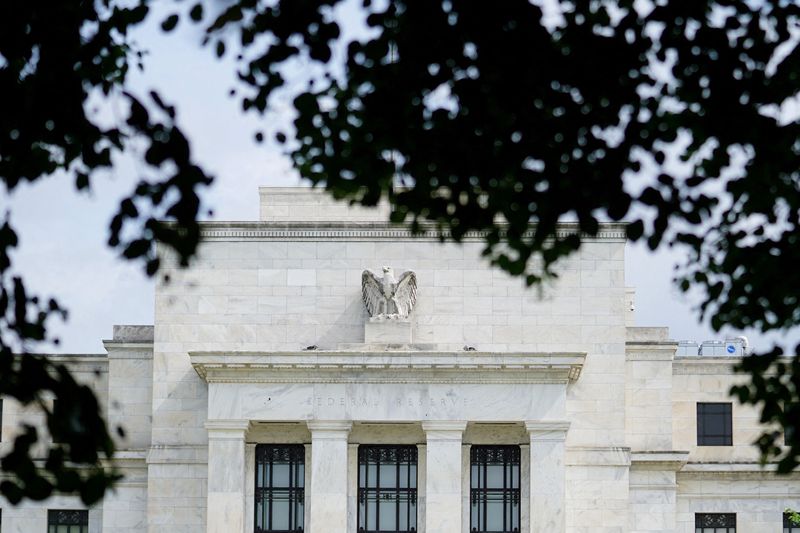A look at the day ahead in U.S. and global markets from Mike Dolan
Even though futures pricing had already turned queasy before the sticky September inflation report on Thursday, the prospect of the Federal Reserve skipping another interest rate cut next month has now become part of the mix.
An aggravating miss on U.S. consumer price readings for last month, which saw the annual core inflation rate unexpectedly tick higher to 3.3%, was partly offset by a jump in weekly jobless claims amid distortions from recent strikes and storms.
But the picture encouraged doubts about whether the Fed will cut again in November, with some Fed officials clearly wavering.
The relatively hawkish Atlanta Fed boss Raphael Bostic told the Wall Street Journal he was considering a pause until the data fog lifted a bit. “Maybe we should take a pause in November. I’m definitely open to that.”
While other Fed officials indicated further easing was still in store, futures remain only just over 80% priced for another quarter point rate cut on November 7.
That meeting comes just two days after the U.S. election – coming on a Thursday that week as it was pushed back a day because of the voting.
The Fed fervently dismisses any consideration of the political calendar in its deliberations. But with the White House race on a knife edge, and such critical long-term issues on trade, taxes and immigration at stake, it’s possible Fed policymakers won’t know the final outcome by the time they decide.
There’s plenty of data to parse in the meantime, including a another reality check on inflation from the producer price report later on Friday – a series that contains some critical components of the Fed’s favored PCE inflation gauge.
Annual core PPI inflation is expected to have risen to 2.7% from 2.4% last month, even though headline rates should fall further below 2.0%.
Ahead of that release, 10-year Treasury yields held off two-month highs hit after the CPI on Thursday but two-year yields fell back below 4%. The dollar index slipped back from near two-month highs too.
With weekend nerves around the Middle East conflict keeping energy markets on edge, oil prices remain relatively contained and U.S. crude hovered about $75 per barrel. Storm damage in Florida from Hurricane Milton was being assessed.
Wall Street stocks took only a glancing hit from the fresh uncertainty over rates and inflation, pulling back slightly from new records yesterday as the third quarter earnings season now gets underway.
Stock futures were marginally in the red first thing on Friday, with banks JPMorgan, Bank of New York Mellon and Wells Fargo due to report later alongside asset manager BlackRock.
S&P 500 earnings are estimated to have increased 5.3% over the year-ago quarter, down from a second-quarter gain of 13.2%.
Technology and communication services sectors are forecast to have the strongest year-over-year growth with 12-15% advances, but financials are expected to lag with annual growth of less than 2%.
Elsewhere, Hong Kong markets were closed for a holiday on Friday but the mainland Chinese index fell back again ahead of a hotly-anticipated Saturday press conference that’s expected to detail fiscal stimulus measures to accompany the recent monetary easing from Beijing.
South Korea’s won firmed up after the central bank kicked off its easing cycle and delivered what the governor described as a ‘hawkish cut’ in interest rates – lowering borrowing costs by a quarter point, as expected.
Japan’s Nikkei advanced and Europe’s held the line.
European markets were monitoring fallout from the French budget late on Thursday, after Prime Minister Michel Barnier outlined plans for 60 billion euros ($66 billion) worth of spending cuts and tax hikes.
The big question there now is whether the plans can pass through a divided parliament, and rating agency Fitch is due to review its assessment of France’s sovereign credit rating later in the day.
French government bonds were steady on Friday, and the euro ticked higher against a generally softer dollar. The European Central Bank is widely expected to cut interest rates again next week for the third time this year.
Sterling rose slightly after news Britain’s economy grew in August after two consecutive months of stagnation, providing some relief to finance minister Rachel Reeves ahead of the new Labour government’s first budget later this month.
Key developments that should provide more direction to U.S. markets later on Friday:
* US September producer price inflation, University of Michigan October sentiment survey; Canada Sept employment report; Mexico Aug industrial output
* Dallas Federal Reserve President Lorie Logan, Fed Board Governor Michelle Bowman and Chicago Fed chief Austan Goolsbee all speak
* US corporate earnings: JPMorgan, Bank of New York Mellon, BlackRock, Wells Fargo, Fastenal
* Ukraine President Volodymyr Zelenskiy meets German Chancellor Olaf Scholz in Berlin. Russian President Vladimir Putin meets Iran’s President Masoud Pezeshkian in Ashgabat
(By Mike Dolan, editing by Christina Fincher; [email protected])
Read the full article here
